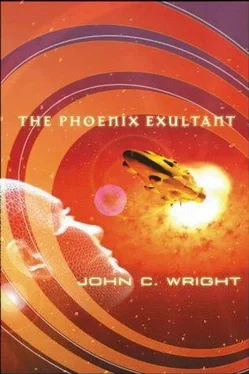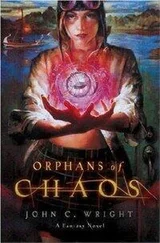There may have been beautiful music sweeping the area; excluded from the mentality, Phaethon was deaf to it. Here and there were hospice boxes or staging pools, ready to send out dreams or partials, calls, messages, or any form of tele-presentation. All channels were closed to Phaethon, and he was mute. There were dragon-signs burning like fire in the air, displaying messages of unknown import. Phaethon could not read the subtext or hypertext; Phaethon was illiterate. There may have been thought-guides in the Middle Dreaming to allow him to remember, as if he had always known, where to find the public transport he sought. Mnemonic assistance gone; Phaethon was an amnesiac. There may have been ornament and pageantry in the dream-stages gathered in the air around him, lovely beyond description, or signs and maps to show Phaethon where, in this wide concourse, might be the way or the road he sought. But Phaethon was blind.
Here and there among the mannequins, the face of a realist or vivarianist showed. Their eyes turned dull when they lit on Phaethon, and their gazes slid past him without seeing. All sense-filters were tuned to exclude him. The world was blind to him as well.
He expected the banners overhead to swoop down on him when he looked up. But no. They floated on by, shouting with lights and garish displays. Even the advertisements ignored him.
No matter. Phaethon tried to keep his thoughts only on the next steps immediately before him. How to find out where he was? How to find Talaimannar? How to go from here to there? Once there, how to find out why Harrier Sophotech recommended that place?
He had to ask someone for help, or directions.
Phaethon stepped behind a stand of bushes; there was a flow of water from the fountain works overhead, forming a rippling, translucent ceiling. Was anyone watching? He assumed not.
He doffed his armor and covered it with the cape of nanomaterial, which he then programmed to look like a hooded cloak. Phaethon himself merely drew out some of the nanomaterial from the black skin-garment he wore, and drew circles around his eyes, to solidify into a black domino mask. And that was that: Both of them were now in disguise. He hoped it was enough to fool at least a casual inspection. He programmed the suit to follow him at a fixed distance, avoiding obstacles; to "heel" as Daphne would have said.
He stepped out again into the concourse, followed by the bulky, cloaked form of his armor, looming three paces behind him. He went downstairs and found a pondside esplanade that had fewer mannequins walking along it. He saw real faces; faces made of flesh or metal, or cobra scales, or polystructural material, or energy surfaces. They were laughing and talking, signaling and depicting. The air seemed charged with a carnival excitement. Many people skipped or danced as they strolled, moved by music Phaethon could not hear. Others dived over the side of the esplanade, to glide among the buildings and statues in the pond.
He did not know what particular event was being celebrated. It was rare to see so many folk together. Whatever bunting or decoration swam in the dreamspace here, which might have given him a clue as to the nature of the occasion, was, of course, invisible to him.
People smiled and nodded at him as they walked by, full of good cheer. "Merry Millennium! May you live a thousand years!"
He had not realized how much he had missed, and was going to miss, the sight of friendly human faces. Phaethon smiled back, waving, and calling out, "And a thousand years to you!"
Phaethon reminded himself that he had to be careful. Theoretically, the masquerade protocol would not protect him, since he was no longer part of the celebration, no longer part of the community. But how many people would even try to read his identity if they saw him wearing a mask during a masquerade? Most people, Phaethon guessed, would not.
The rule from the Hortators was that no one was to give him aid, comfort, food or drink, or shelter, sell him goods or services, or buy from him, or donate charity to him. This rule did not (in theory) actually prohibit speaking to him, or looking at him and smiling, although that was the way it surely would be practiced.
If Phaethon tried to buy something from a passerby, Aurelian was obligated to warn him that he was about to be contaminated with exile. But as long as Phaethon did not try to win from the passersby either food or drink or comfort or shelter or charity, Aurelian would no doubt stand mute. Sophotechs had a long, long tradition of failing to volunteer any information that had not been specifically asked.
It was hard. A couple walking hand in hand were passing out wedding-album projections of their future children. Phaethon smiled but declined to take one. A young girl (or someone dressed as one) skipping and licking a floating balloon-pastry offered him a bite; Phaethon patted her on the head, but did not touch her pastry. When a laughing wine-juggler, surrounded by musical firecrackers, and balancing on a ball, rolled by and tried to thrust a glass of champagne into Phaethon's hand, Phaethon was not able to refuse except by jerking his hand away.
The juggler frowned, wondering at Phaethon's lack of courtesy, and raised two fingers as if to try to find out who Phaethon really was. But the juggler was distracted when a slender, naked gynomorph, fluttering with a hundred stimulation scarves, jumped up in drunken passion to embrace him. Singing a carol to Aphrodite, the two rolled off together, while the juggler's bottles and goblets fell this way and that.
Phaethon let the throng carry him down the esplanade.
The pressure of the crowd eased when Phaethon came to a line of windows, two hundred feet tall or more, which looked out upon a balcony larger than a boulevard. Out onto the balcony they all went together. Phaethon climbed up a pedestal holding a statue of Orpheus in his pose as Father of the Second Immortality. The stone hands held up a symbol in the shape of a snake swallowing its own tail. Phaethon put his foot in the stone coils of the serpent and pulled himself high, looking left and right above the heads of the crowd.
Several lesser towers and small skyscrapers grew up from the railing of the balcony, like little corals fringing the topless supertower of the space elevator.
Beyond the balcony, the metropolis spread out from the mountain-base of the space elevator in three concentric circles. Innermost and oldest, the center circle consisted of huge windowless structures shaped according to simple geometries; giant cubes, hemispheres, and hemicylinders, painted in bright, primary colors, connected by rectilinear motion-lines and smart roads. The architecture followed the Objective Aesthetic, with the building shapes, slabs, and plaques all rigidly stereotyped. There was little movement in this part of the city; human beings of the basic neuroform tended to find these faceless buildings and looming monoliths intolerable. Mostly, this central ring housed Sophotech components, warehouses, manufacturies. Invariants, who had little desire for beauty or pleasure or inefficiency, lived here, dwelling in square dormitories arranged like rank upon rank of coffin-beds.
The second ring was done in the Standard Aesthetic. Here were black pools and lakes of nanomachinery, with many brooks and rills, touched with white foam of the dark material streaming from one to another. Tiny waterfalls of the material formed where cascade-separator stages mixed and organized the components. Each lake was surrounded by the false-trees and coral bioformations of nanomanufactory. A hundred solar parasols raised orchidlike colors to the sun. The houses and presence chambers were formed of strange growth, like sea-shells; one spiral after another, shining with lambent mother-of-pearl, rose to the skyline. Blue-black, dark pearl, glinting silver, and dappled blue-gray hues dominated the scene. Thought-gardens, coven places, and sacred circles dotted the area, along with nymphariums, mother trees, and staging pools. Warlocks and basics tended to prefer the chaotic fractals and organic shapes of the Standard Aesthetic. Wide areas of garden space were occupied by the decentralized bodies of Cerebellines.
Читать дальше











